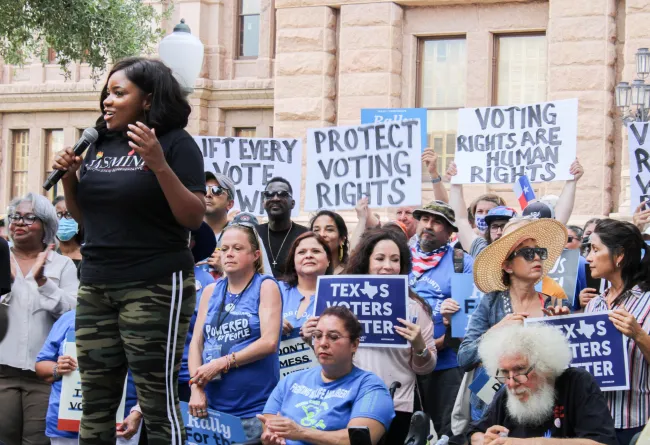Jasmine Crockett: Debunking False Racism Claims and Exposing Racial Double Standards
Recent online narratives have unfairly labeled Congresswoman Jasmine Crockett (D-Texas) as “racist.” However, a closer examination of her career and public statements reveals a consistent record of fighting systemic racism while frequently being subjected to racially charged attacks. Below, we break down key incidents to clarify the context behind these accusations.
1. A Target of Racist Attacks from MAGA Supporters
Crockett has faced relentless backlash from far-right critics, especially after speaking out against former President Donald Trump’s policies. In January 2025, she took to Instagram Live to denounce Trump’s proposed federal spending freeze, calling it part of a “white supremacy agenda” outlined in Project 2025. In response, MAGA supporters flooded her social media with racist and misogynistic insults, including slurs like “ghetto trash” and “coconut head.” These attacks illustrate a broader pattern of racial hostility toward Black women in politics rather than any racism on Crockett’s part.
2. Clashes with Republican Lawmakers
Crockett’s heated exchanges with Republican colleagues have often been misrepresented as aggressive or unprofessional.
- Marjorie Taylor Greene: During a May 2024 House Oversight Committee hearing, Greene mocked Crockett’s “fake eyelashes.” Crockett called out the remark as racist, highlighting how Black women’s appearances are unfairly scrutinized while similar choices by white women go unchallenged.
- Nancy Mace: In a January 2025 debate on transgender rights, Mace challenged Crockett to “take it outside” after Crockett dismissed her comments as fearmongering. Critics then accused Crockett of “ghettoizing Congress,” using racially coded language to mischaracterize her assertiveness.
These incidents reveal how Crockett’s confident communication style—rooted in her background as a civil rights attorney—is often reframed through a racial lens to portray her as combative rather than passionate.
3. Advocacy for DEI and Historical Accountability
Crockett has been a strong defender of Diversity, Equity, and Inclusion (DEI) programs, arguing that they are crucial for addressing systemic inequalities.
- During a CNN panel, she pushed back against GOP commentator Scott Jennings, who blamed DEI for wildfire response failures. She responded: “If we were good enough to build this country, we are good enough to serve in it.”
- She criticized Trump’s dismantling of DEI efforts, arguing that such rollbacks suppress marginalized voices, particularly at historically Black colleges and universities (HBCUs).
- Her pointed remark about “mediocre white boys” opposing DEI sparked controversy but underscored her commitment to challenging systemic privilege.
4. Comments on “White Tears” and Trump’s “Thug” Leadership
In a February 2025 CNN interview, Crockett called Trump a “white supremacist” and dismissed the outrage from his supporters as “white tears,” emphasizing that leadership should be judged on competence, not race. She also linked his pardoning of January 6 rioters and his purging of federal agencies to authoritarian tactics, declaring, “We have a thug in charge of the United States.” While MAGA supporters condemned her language, her remarks were critiques of structural racism, not personal attacks based on race.
5. The Double Standard in Political Discourse
Crockett’s experiences highlight how lawmakers of color are often held to different standards than their white counterparts.
- Her use of “chile,” a common expression in Black communities, was misinterpreted as disrespectful by Nancy Mace, who insisted on being addressed as “a grown woman.”
- While Crockett’s sharp responses—such as calling Greene’s physique “bleach-blonde, bad-built butch”—drew criticism, they were reactions to personal attacks that congressional leaders largely ignored.
Conclusion: Context Matters
Labeling Jasmine Crockett as “racist” ignores the systemic racism she fights against and the racialized hostility she endures. Her advocacy for marginalized communities and her refusal to remain silent in the face of attacks position her as a leader challenging inequity—not perpetuating it. As political discourse grows increasingly polarized, recognizing the racial dynamics at play is crucial to evaluating such claims fairly.
